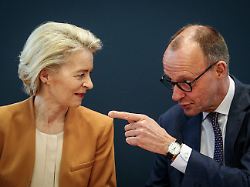In order to secure the support of CDU leader Merz in the European elections, EU Commission President von der Leyen must subordinate her climate agenda to economic interests. She has already made some withdrawals. In the election campaign, the focus is on competitiveness.
The European Union, the green idyll. An armada of electric cars on the streets. Agriculture in harmony with nature. A sea of wind turbines and solar cells. Climate neutrality by 2050. These are ambitious goals that EU Commission President Ursula von der Leyen has been pursuing with her Green Deal since she took office in the summer of 2019. Five years later, von der Leyen’s main aim is to keep her office. She receives support for this from the CDU executive board, which has proposed her as the top candidate of the European party family EPP for the future Commission presidency. However, von der Leyen had to make concessions in order to be allowed to enter the race again.
This becomes clear at the latest when she announces her candidacy in the Konrad-Adenauer-Haus, the CDU party headquarters. Friedrich Merz stands next to von der Leyen. The CDU chairman speaks first. He explains straight away where his priorities lie. On the one hand, the European Union must “ensure security”. On the other hand, the most important message is to “secure prosperity,” only then will there be social security and a successful “transformation to a climate-neutral economy,” said Merz. The order of the demands is crucial here: First and foremost, Merz’s focus is on prosperity as a guarantee for a functioning social and climate policy. Merz says he wants nothing less than a “turnaround in economic policy,” although he agrees with “Mrs. von der Leyen.”
Merz supports the climate goals of the Green Deal, but always with the reservation that the economy does not suffer. Von der Leyen has often faced headwinds in her party for her ambitious environmental policy. Critics saw her more with the Greens than with the Union. But now von der Leyen also assures that he wants to achieve the climate goals together “with the economy”. It is already taking concrete steps to reduce bureaucracy in the EU. She wants to reduce the reporting requirements for companies by 25 percent. “Plannability and reliability for investors” are important. She is now looking to talk to representatives from industry and agriculture. She wanted to ask them a crucial question: “What do you need so that we can achieve our climate goals?”
Von der Leyen forced to make U-turns
The farmers’ protests, which have also been directed against the EU’s agricultural policy in recent months, have already forced von der Leyen to make one or two about-faces. In mid-February, the EU Commission relaxed environmental regulations for farmers, although no majority of EU states supported it. Retroactively to January 1st of this year, the requirement to leave four percent of arable land lying fallow or used unproductively was suspended. In addition, von der Leyen withdrew a proposal for an environmental protection law against high use of pesticides – on the grounds that the regulation had become a symbol of polarization.
These decisions are also due to pressure within the party. Manfred Weber, CSU member and chairman of the European People’s Party (EPP), revolted last year against a law to restore nature. In the summer, Weber looked for allies to prevent the regulation because, in his view, it unilaterally burdens farmers with the costs of climate protection. However, the European Parliament voted in favor by a narrow majority. A defeat for Weber, as even members of his parliamentary group resisted his call to vote against the amendment.
However, in order to keep her office, von der Leyen depends on allies in the Union and the EPP. This is also evident in the joint appearance with Merz. The federal executive board of the CDU unanimously voted for von der Leyen’s candidacy this Monday, says Merz. “I will personally work to ensure that this unanimity is also achieved at the EPP congress on March 6th and 7th,” he added. If European conservatives, without exception, support von der Leyen, it will increase her chances of remaining Commission President. According to current polls, it is likely that the EPP will again be the strongest party in the European elections. Merz also emphasizes this.
Strong criticism from the FDP and the Greens
He probably doesn’t act completely selflessly. The traffic light government’s coalition agreement states that the Greens will nominate the German commissioner after the European elections “as long as the commission president is not from Germany.” With von der Leyen, Merz can prevent this and secure a prominent position for his CDU in the next EU Commission.
Both the Greens and the FDP complain that von der Leyen wants a second term as EU Commission President but is not running in the European elections. “Von der Leyen was made President of the Commission by the heads of government. That’s how things should work again now,” says Green MEP Daniel Freund. FDP top candidate Marie-Agnes Strack-Zimmermann criticized on ntv that von der Leyen apparently wanted to “jump from the side into the stands.” The complaints are an indication that some parties already feel ignored when it comes to determining who will head the Commission. However, von der Leyen is dependent on the heads of state and government of the member states as well as on parliament for her re-election. Despite the good poll numbers for the EPP, things could be tight for them.
